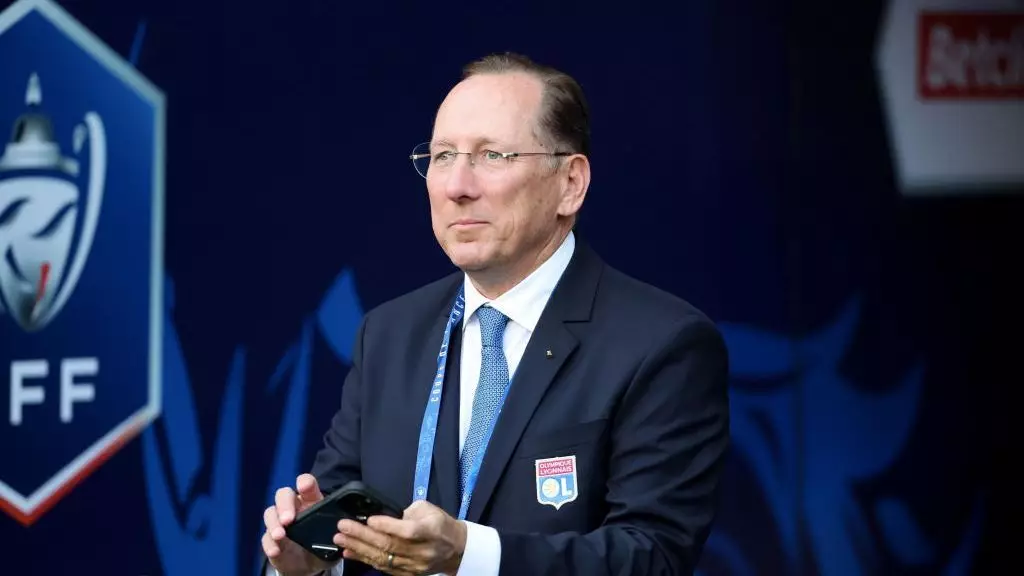In the world of football, conflicts often emerge not only on the pitch but also off it, where personalities clash and power dynamics come into play. The recent comments made by John Textor, the American owner of Olympique Lyonnais, illustrate this phenomenon vividly. Textor’s criticism of Nasser Al Khelaifi, president of Paris Saint-Germain (PSG), and Vincent Labrune, head of Ligue 1, during a radio interview on RMC has sparked widespread discussion. This article will delve into the implications of Textor’s remarks, examining the underlying tensions and broader ramifications for French football.
In his interview, Textor did not shy away from describing Labrune as Al Khelaifi’s “lapdog,” suggesting a troubling imbalance in the governance of Ligue 1. His assertions raise fundamental questions about conflict of interest within the league. As the President of PSG and simultaneously the head of the BeIn Sport media group, Al Khelaifi’s influence is palpable, affecting the decision-making processes that impact all clubs in the league. Textor’s shock at Al Khelaifi’s control during meetings underscores a prevailing concern about the fairness and integrity of Ligue 1’s leadership.
Textor articulated his discomfort when he observed Al Khelaifi monopolizing discussions about TV rights while Labrune remained silent. Such observations paint a troubling picture; it raises awareness of the potential risks that come with concentrated power in football. When the head of a club also leads a broadcasting entity, the lines between loyalty to the league and loyalty to the club can blur, leading to ethical dilemmas that may distort competition.
PSG’s retort to Textor’s allegations was swift and dismissive. The club characterized his comments as “rude and dense,” suggesting that Textor’s perspective lacks legitimacy. While it is essential to defend one’s position and reputation, the tone of PSG’s response raises eyebrows. Instead of engaging with the substance of Textor’s claims, they resorted to personal attacks, which could be seen as an attempt to deflect scrutiny.
This defensive posture frequently occurs in football, where clubs often focus more on reputational management rather than addressing substantial issues at hand. Textor’s experience reflects a stark reality; when major stakeholders raise concerns, they often meet resistance rather than open dialogue. This trend hampers the evolution that French football desperately needs in its governance structures.
The conflict between Textor and Al Khelaifi is not a new one. Their rivalry can be traced back to the summer of 2022 when Textor acquired Lyon amid concerns about the influence of PSG over the league. The broader context of financial disparities in football cannot be ignored, amplifying the stakes in this feud. Clubs like PSG, with substantial financial backing, can overshadow others, creating a sense of disillusionment among owners like Textor who seek to foster a competitive environment.
Moreover, as Textor brings experience from operating other clubs such as Crystal Palace and Botafogo, his perspective is shaped by international practices that prioritize transparency and equitable governance in football. His critique serves as a microcosm of the tension that exists between established powerhouses and the emerging clubs that strive for recognition.
Textor’s allegations serve as a pivotal point for discussions surrounding the future of Ligue 1. If the league aims to present itself as a competitive entity on the European stage, it must address the concerns regarding governance and conflicts of interest brought to light by these comments. A transparent framework for decision-making that diminishes the influence of individual personalities like Al Khelaifi is essential for ensuring a level playing field.
John Textor’s remarks about Nasser Al Khelaifi and Vincent Labrune underscore the pressing need for reform in French football. The interplay of power, ethics, and governance remains a central challenge that could determine the trajectory of Ligue 1. As the footballing landscape evolves, stakeholders must engage in meaningful discussions that prioritize integrity over personal grievances, ensuring that the sport remains engaging and competitive for all.

